A lot of people seem to think that cats and kittens can have the same food. However, that is not true! Like human babies, cat babies (or kittens) have special nutritional needs too. Due to this, the food that kittens need to be fed varies significantly from the diet you give to a senior cat. There is a strong relationship between a cat’s age and the food that it consumes.
Our guide will explain how a cat’s food by age should change and what you should know about your feline’s changing nutritional requirements. We begin by talking about the food that a kitten needs to eat to stay fit, healthy, and active. We then move to discuss the food you should be feeding your senior or older cats.
Since cats can live up to almost 15-17 years, when they become old, they have special food requirements too! Once you read our guide, you will understand why a cat’s food should change with age.
What Are a Kitten’s Nutritional Needs?
Anyone who owns a kitten will know that these little animals are bundles of energy. They bounce from one corner to the other in the blink of an eye! So how do you make sure your kitten stays fit and active like this and grows up to be a healthy adult? Cat’s food that is designed especially for kittens has to be extremely high in energy.
This is necessary if you want your cat to stay active all day. In addition to this, food for kittens must be rich in proteins as well. This is because, in this growing age, the body and cells of kittens are growing and developing daily. Proteins are the basic element in our cells and organs, which is why you need to ensure that your kitten gets plenty of these through its diet.
Some vets even say that a significant 30% of your kitten’s food should consist of protein. If you weigh your cat during the initial weeks of its life, you will be surprised to know that its body weight can increase twice as much in just a matter of weeks. To sustain these drastic growth spurts, you, therefore, need to keep your kitten supplied with plenty of vitamins and good quality food.
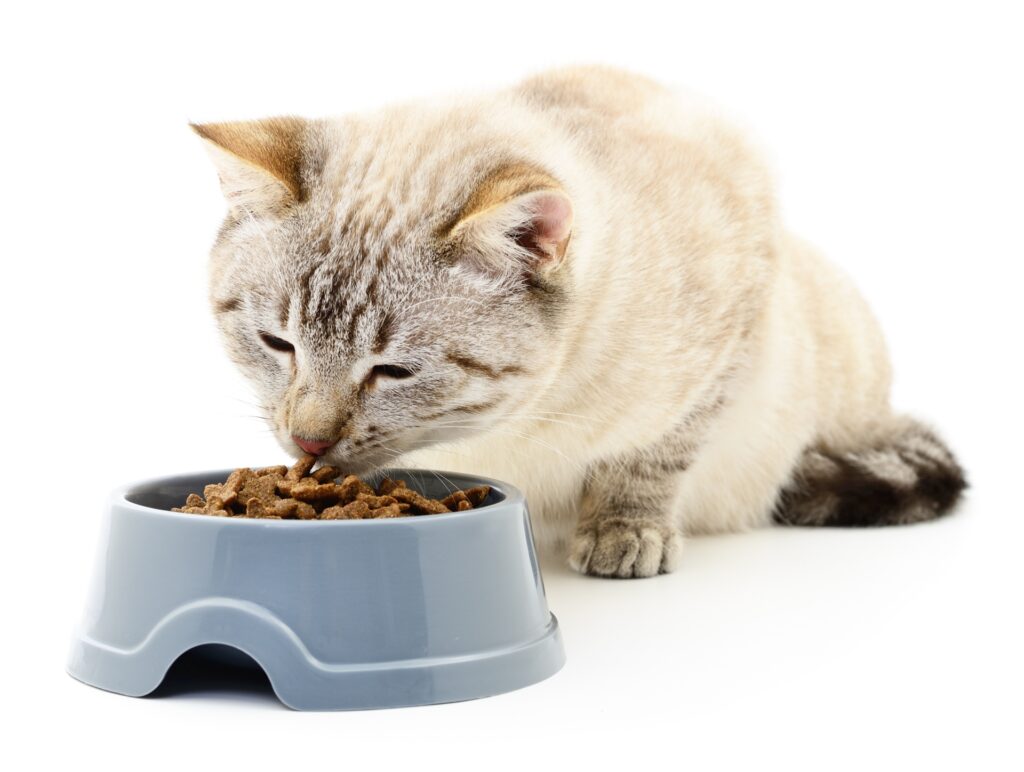
In addition to the nutrient composition of the kitten food, you should also be aware of how frequently you should be feeding your kitten. There is not just a connection between the type of food and the cat’s age. There is also a connection between the frequency with which the cat needs to be fed and its age.
With older cats, two good meals a day are enough to satisfy them. However, kittens are not as well-trained as older cats and get hungry more frequently due to their active schedules. This is why kittens need feeding almost 4 to 5 times a day. These meals will help keep them sustained throughout the day and satisfy their habit of snacking!
How to Select the Right Kitten Food?
Now that we know that kittens need proteins and amino acids in their cat’s food, how do you choose which brand is best for your kitten? If you have a regular visiting schedule settled with your vet, we suggest you ask your vet about which cat food brands are the most reliable in the market. However, you can make a choice yourself as well! Try not to go with brands that are not well-known and make generic claims.
Try to find a cat food that the American Association approves of Feed Control Officials. Since the Association consists of experts on cat nutrition, foods approved by them are generally healthy and reliable. We also understand that some people think they need to give their kittens extra supplements and vitamins to keep them healthy. That is not exactly true.
If your kitten is healthy, and the AAFCO approved food says it is sufficient for a balanced nutritious diet, you do not need to give any extra supplements. Trust us, there is something called “too much of a good thing is bad too”! This is why unless your vet recommends some special supplements; we do not suggest you give them to your kitten.
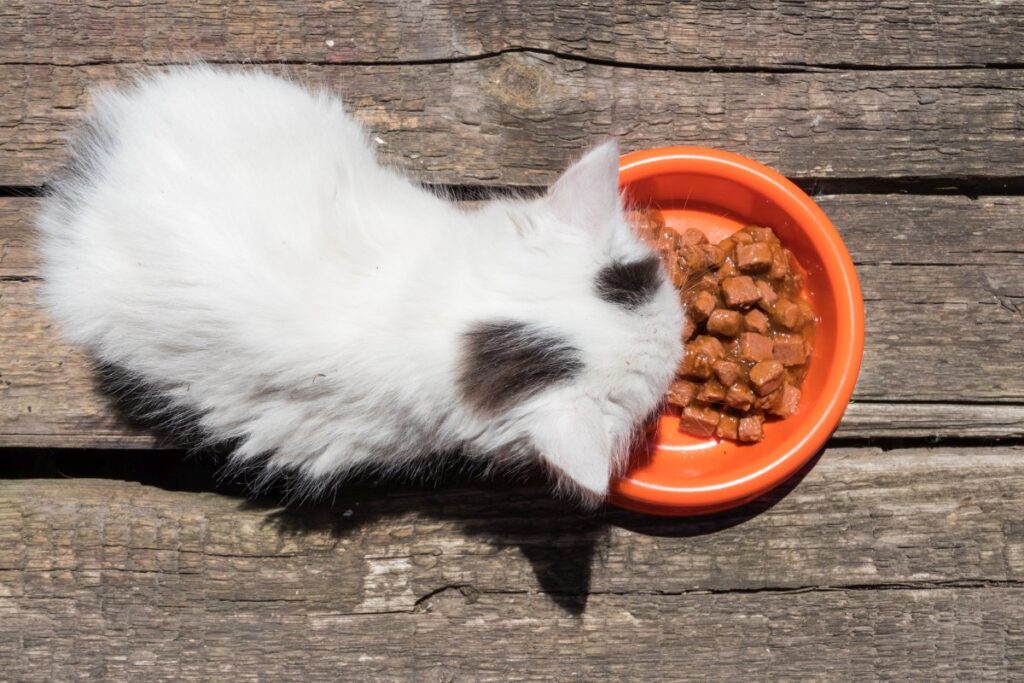
Can You Switch Between Kitten Foods?
Kittens are famous for being picky eaters, so if you want to change your young cat’s food, there are certain things you should be aware of at the start. Firstly, try not to change your little feline friend’s food too often. This is because trying all these different foods can cause them to develop digestion problems, which can cause further health issues.
The next thing you should keep in mind is introducing your kitten to different kinds of foods and textures. Please do not do this very fast, but getting them to try a new thing now and then can be useful for them in the long run. This is because being used to different foods ensures that your cat doesn’t become too picky and can transition to new foods if the need arises. The third thing you should consider when introducing your kitten to a new food is to make the transition slow.
So what you can do is put lesser amounts of the old food into your kitten’s feeding tray. Once you do this and put a tray full of the new food in front of them, your kitten will try the new food simply because it is hungry! If your cat ends up hating the new food completely such that it refuses to eat at all, switch to the old food. Keeping your kitten fed and satisfied is the most important thing after all!
Does It Matter if I Feed My Kitten Wet or Dry Food?
As a general rule, it does not make a great difference if you feed them canned food or dry food when it comes to adults. This is because adult cats can easily adjust themselves to the texture and the taste of the food they are being fed.
However, with kittens, you need to be careful about the type of cat food you are giving to them. Remember that the teeth of young kittens are not as sharp and strong as those of adult cats, which is why it is necessary to give them at least a bit of canned food.
If your kitten’s diet consists of cat food that is both dry and wet, then give your kitten canned food for at least two meals. However, if you only feed your kitten canned food, we suggest giving it four meals a day. Canned foods are also a great source of water and hydration for your kittens, which is a bonus. This is why our expert advice will always tell you to integrate some canned cat food as part of your kitten’s diet.
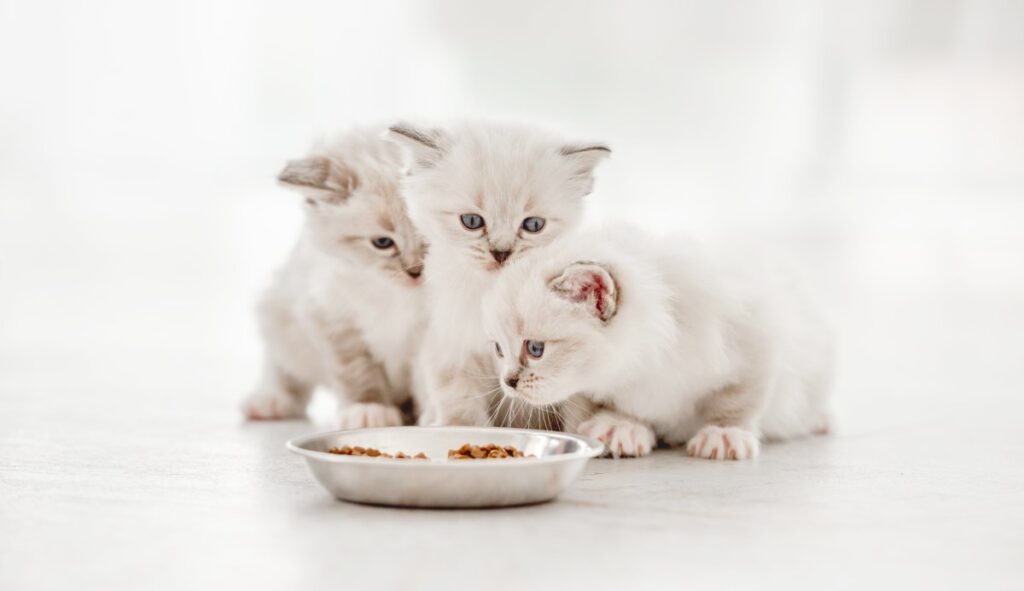
Are There Foods My Kitten Should Not Eat?
You should steer clear of certain foods if you want your kitten to stay healthy and fit. As a rule, remember that garlic, tea, coffee, chocolate, raisins, onions, and grapes are toxic for kittens! We know that these items are found commonly in every household, so you should make a special effort to keep them out of your kitten’s reach! Also, ensure that your kitten does not eat raw meat as part of its cat’s food since this can contain harmful, disease-causing germs and bacteria.
Another thing that we would ask you to be careful with is homemade diets for your kittens. While you can make healthy foods to feed your kittens at home, we suggest steering clear of this. Firstly, the process of making cat food at home can be time-consuming. It can also be costly since you need to go out and buy individual ingredients yourself.
However, most importantly, it will be very difficult, if not impossible, for you to measure out all of the nutrients that your kitten needs in exact quantity. Experts and vets make kitten food that is made especially in factories. They have professional equipment to measure out the correct proportion of every vitamin, nutrient, and mineral that is going into the food so that your kitten gets them in the required amounts. This is why professionally prepared cat food is the best option for your kittens.
How Do You Feed Young Cats?
Feeding young cats does not have to be complicated. A lot of people think that they will have to give young cats food with their own hands. That is not exactly true. According to experts, the best way to feed a kitten cat’s food is by allowing them to feed freely.
This is because young kittens need to be fed often due to their high need for nutrition. This is why, during these early days, they are more likely to do so with ease if you fill up their food dish and let them eat freely.
In addition to this, this method also prevents your kittens from getting digestion-related problems that may occur due to overeating at one fixed mealtime. However, if you see that your kitten is getting obese or overweight, then switch to giving fixed portions at specified times since you do not want your young feline to become obese.
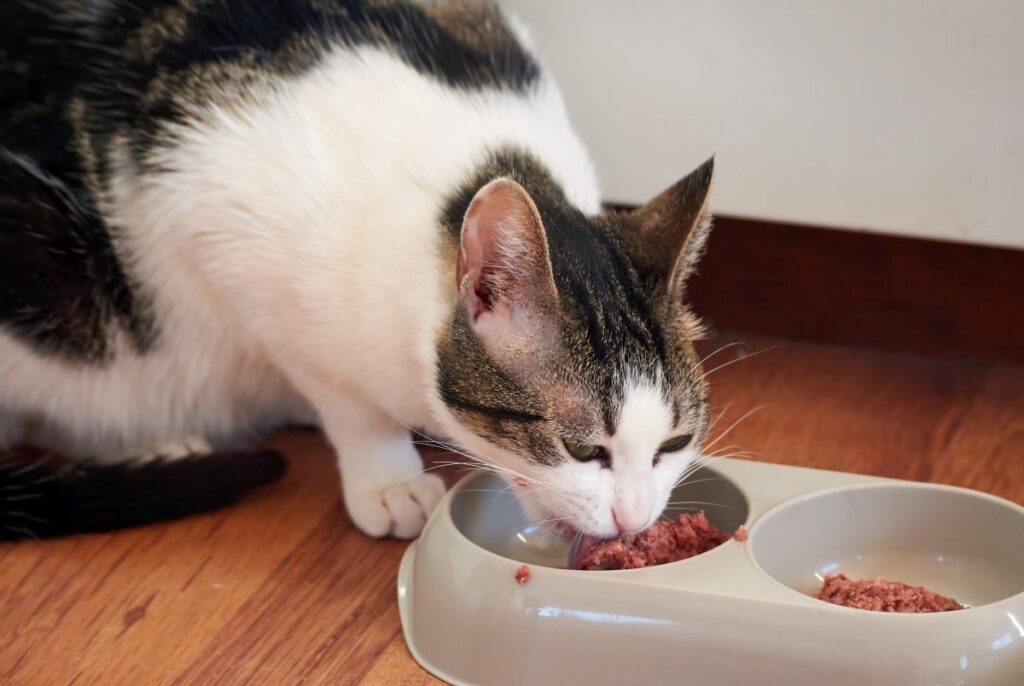
Should I Feed My Kitten Treats?
Now and then, you may be tempted to give in to your kitten’s sweet expressions and feed it its favorite treats. While we are not against treats, we would suggest that treats should not make up more than 10% of your kitten’s calorie intake for the day. We know that kittens need to be given treats to encourage and build good habits and behaviors.
This is perfectly alright, and you should be doing this as long as it remains under the 10% threshold. Giving too many treats instead of proper cat food is akin to feeding junk food to your young kitten. This is why limit the treats and focus more on nutrition-rich foods!
Can You Feed the Same Food to All Senior Cats?
Senior cats all have their food requirements. They have lived all of their lives in different ways, have different tastes, and varying nutrition requirements. We know that senior cats try to act like young cats, but trust them, the years affect their health! As a responsible cat owner, it is your responsibility to take care of the food needs of your senior cats. No two senior cats are identical, which is why their needs can vary according to breed, environment, and physical traits.
How to Prevent Your Senior Cats From Becoming Obese?
One of the problems that are most common among senior cats is that they can become obese. This usually happens because of a range of factors. The biggest reason for obesity amongst cats is that they usually stay indoors in today’s day and age. On top of that, they keep on consuming food that is rich in calories.
The high-calorie food coupled with a lack of exercise is a bit of a killer combination that can cause your feline friend to gain weight. For a better idea, remember that if you feed your cat ten more calories than it needs every day for a year, this can lead to your cat gaining one kilogram per year. However, there are easy ways to prevent obesity in older cats.
Firstly, remember that older cats are not active as younger cats. This is why the cat’s food for older cats should contain fewer carbohydrates and a higher amount of protein. This will ensure that your senior feline friend stays healthy but does not gain too many pounds either.
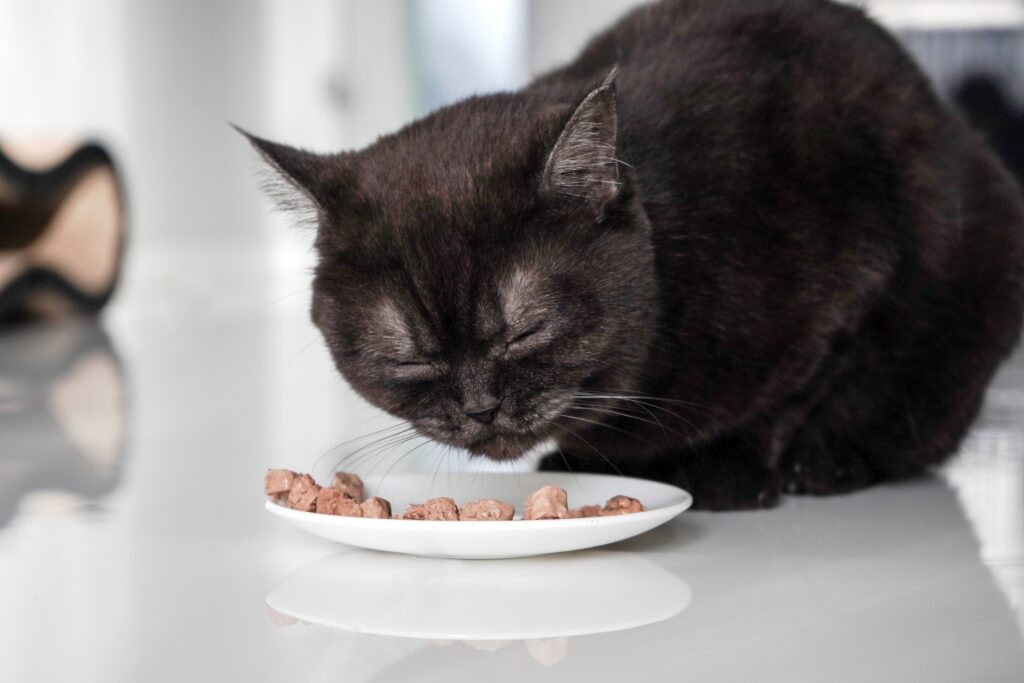
The second tip is to look for food that the AAFCO approves. This is because such foods usually contain a balanced amount of nutrients, which is essential if you want to make sure that your cat is properly nourished.
Still, at the same time, it is also not getting an excess of any one particular nutrient. The third way you can prevent your cat from obesity is by portion control. Remember that you are the person responsible for feeding your cat, so how much food goes into its feeding bowl is in your hands. If you do not want your cat to consume too many calories, pour out lesser food.
Remember that for every kilogram your cat weighs, you can feed them 50 calories. This rule is good for cats that stay indoors and do not engage in intensive physical activities. Once you start doing this kind of portion control, it will be very difficult for your cat to become obese since there will be no chance of overeating! Also, remember that dry food is usually richer in calories as compared to other options. You should check the label at the back of the package to find out the exact number of calories since calorie counting is one of the most efficient ways to maintain weight, whether in cats or humans!
How to Feed a Diabetic Senior Cat?
Diabetes in cats! That sounds very surprising to some people, but trust us, it is more common than you think! Diabetes is one of the most common diseases found in older cats. This can have many causes, but the most common cause of feline diabetes is weight gain and obesity. We have just mentioned how you can prevent your cat from becoming obese, so you can follow those tips to protect your cat from diabetes.
The one thing you should be careful about is that if your senior feline friend has kidney disease, then its cat’s food should contain lower standards of carbohydrates and more protein. This is because this disease affects the kidneys of your feline friends, and proteins are not the best thing for such a disease since their kidneys cannot process this particular nutrient.
In addition to this, if your cat gets diabetes, you should keep communication links with your vet open. This is because, with proper monitoring, your cat’s diabetes can even go away. This is why it is important to get your pet checked carefully and frequently since diabetes can be waved goodbye easily if caught early!
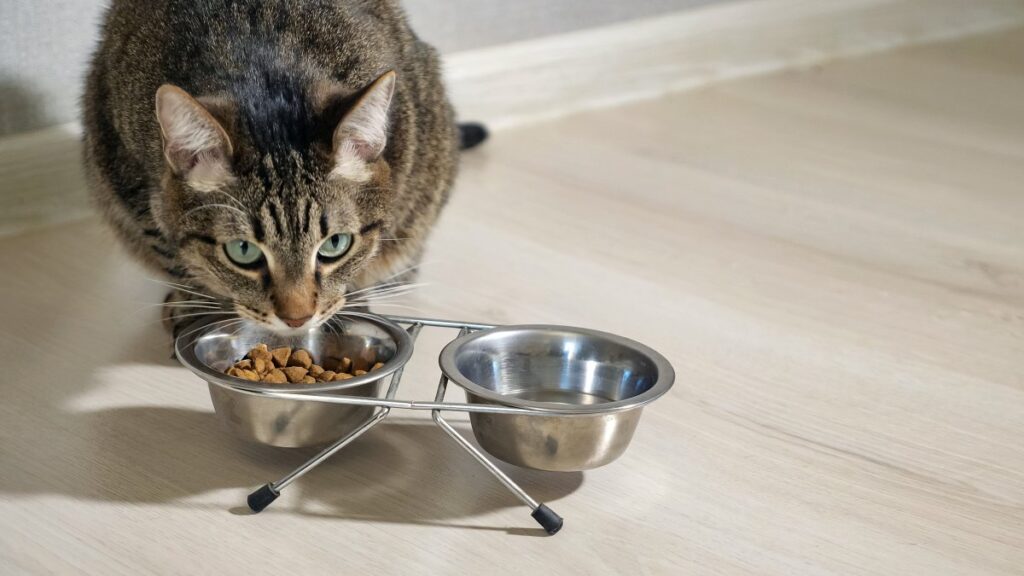
How to Feed a Senior Cat With Kidney Diseases?
Kidney diseases are very prevalent amongst older cats. This is why you should get an older cat frequently checked by the vet to see that your cat’s renal system is working well. According to vets, if your cat has kidney disease, its food should not include phosphorous.
Now we know that many people are not aware of this nutrient, but do not worry! If you want to eliminate this, all you need to do is check the label of your cat’s food to see that it does not contain phosphorous. Please consult your vet to see which brands are better and what is proportions are necessary for your cat according to its weight and age. In addition to this, make sure that your cat’s diet contains a lower portion of salts and proteins compared to what it had before getting kidney disease. This is because both of these nutrients are processed by the kidneys, and if your cat’s kidneys are already weak, then it may not be able to react well to high proportions of these.
What to Do if Your Senior Cat Does Not Eat?
One of the very common problems that owners of senior cats face is that their older feline friends often do not eat as much as young kittens. We know of many cat owners who try to mix up their food to make it appear more appealing, but it seems as if nothing gets them to eat.
This can be a difficult situation because if your cat stays hungry for longer periods, it can end up getting malnourished and start developing deficiencies. This is why if you feel that your senior cat is suffering from appetite loss, consult your vet. Some other serious underlying disease usually causes appetite loss, and consulting with your vet can help you catch it early on and start treating it.
In many cases, vets also prescribe drugs that stimulate your cat’s appetite so that when it feels hungry, it approaches food itself. Such drugs include mirtazapine, so do not worry if you see your vet writing down a prescription for it.
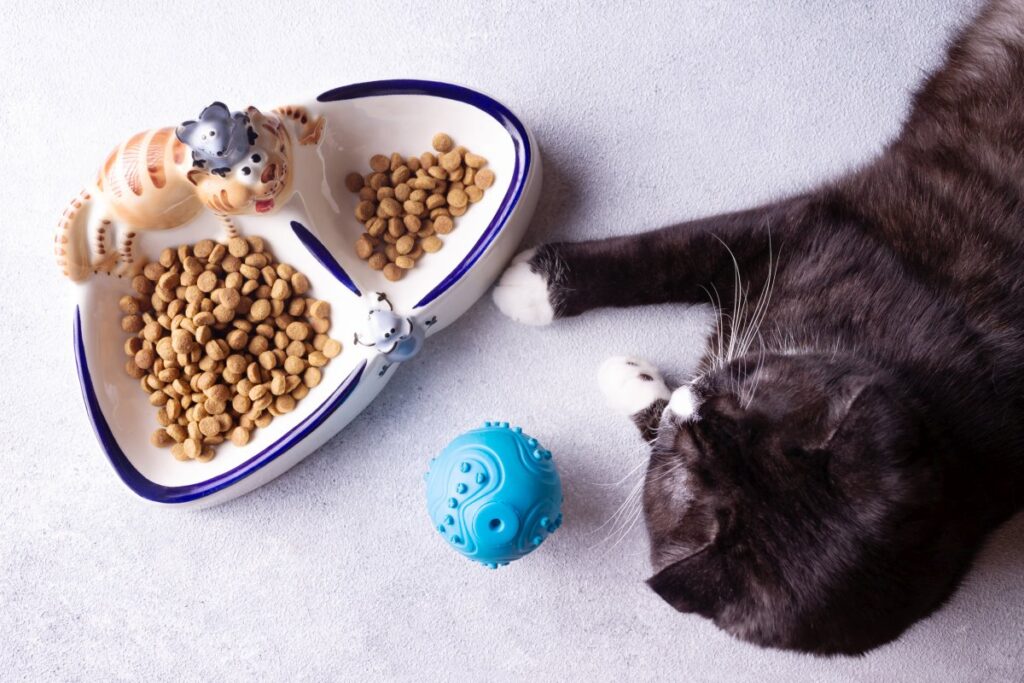
Do Senior Cats Always Need Supplements?
Like with young kittens, we do not suggest giving your senior cat too many supplements either. After all, too many vitamins can also be harmful. If you keep track of your cat’s food and age and alter your cat’s diet accordingly, then your senior feline friend should remain just fine. However, even when you alter your cat’s food by age, it can develop certain conditions that cause nutrition deficiencies.
In such cases, ask your vet about the supplements you should be giving your cat and in what quantities. For instance, your vet might recommend a vitamin B12 supplement if your senior cat has a gastrointestinal disease since this vitamin is not absorbed too well by the body in this condition. Moreover, we would suggest not buying over-the-counter vitamin supplements for your cats since they may not be well suited for them. This is because the effects of many such tablets and supplements are not extensively studied in animals and may be harmful to them in the long run.
Finally!
We hope that our guide helped you understand how cat food and cat’s age both change with time. A cat’s nutritional needs change in every phase of its life. However, a cat is not responsible for its food. So, like a good cat owner, it is your responsibility to stay on top of your cat’s dietary requirements and feed them accordingly.

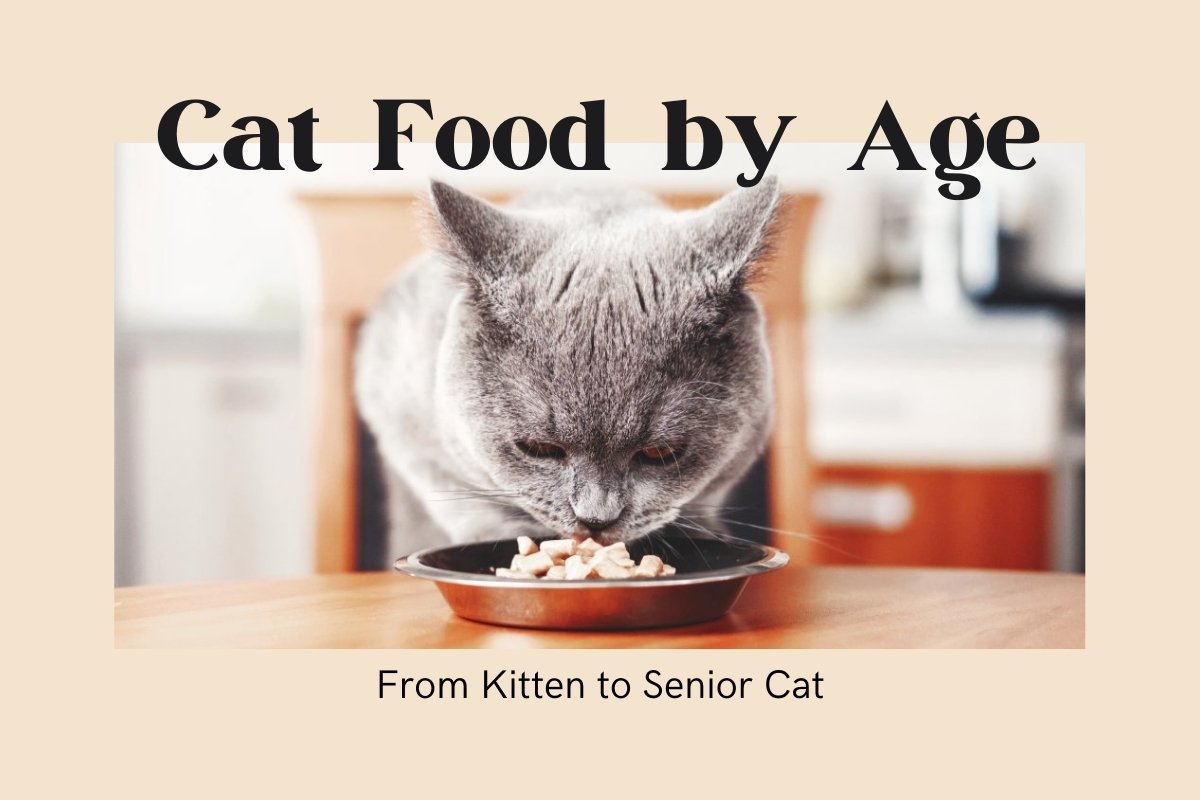
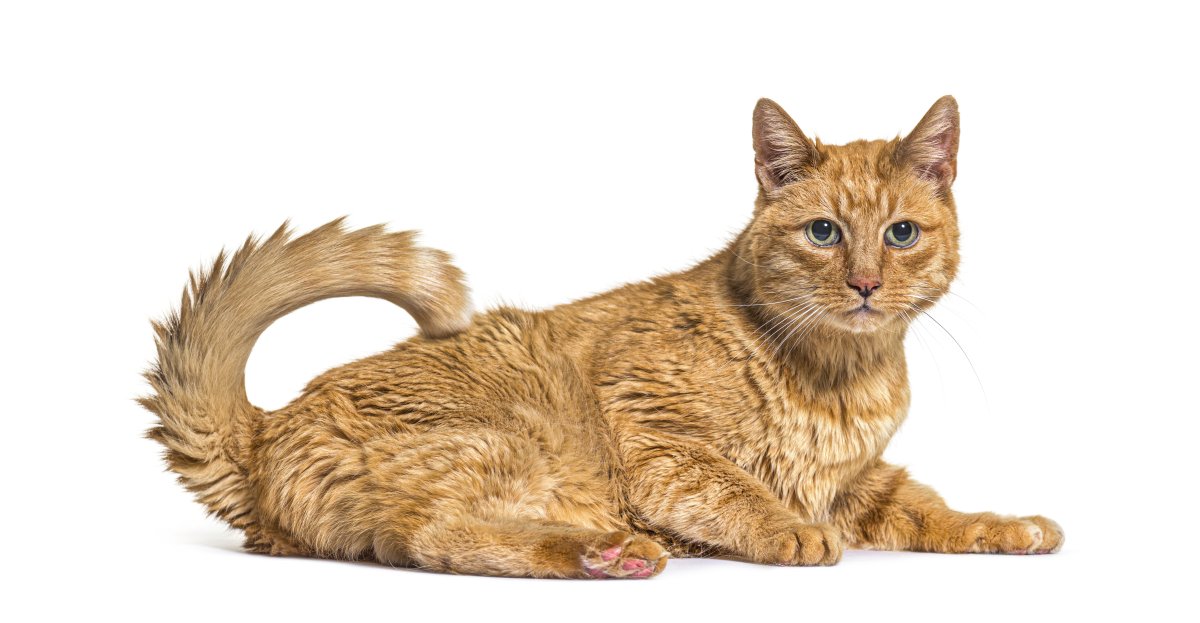
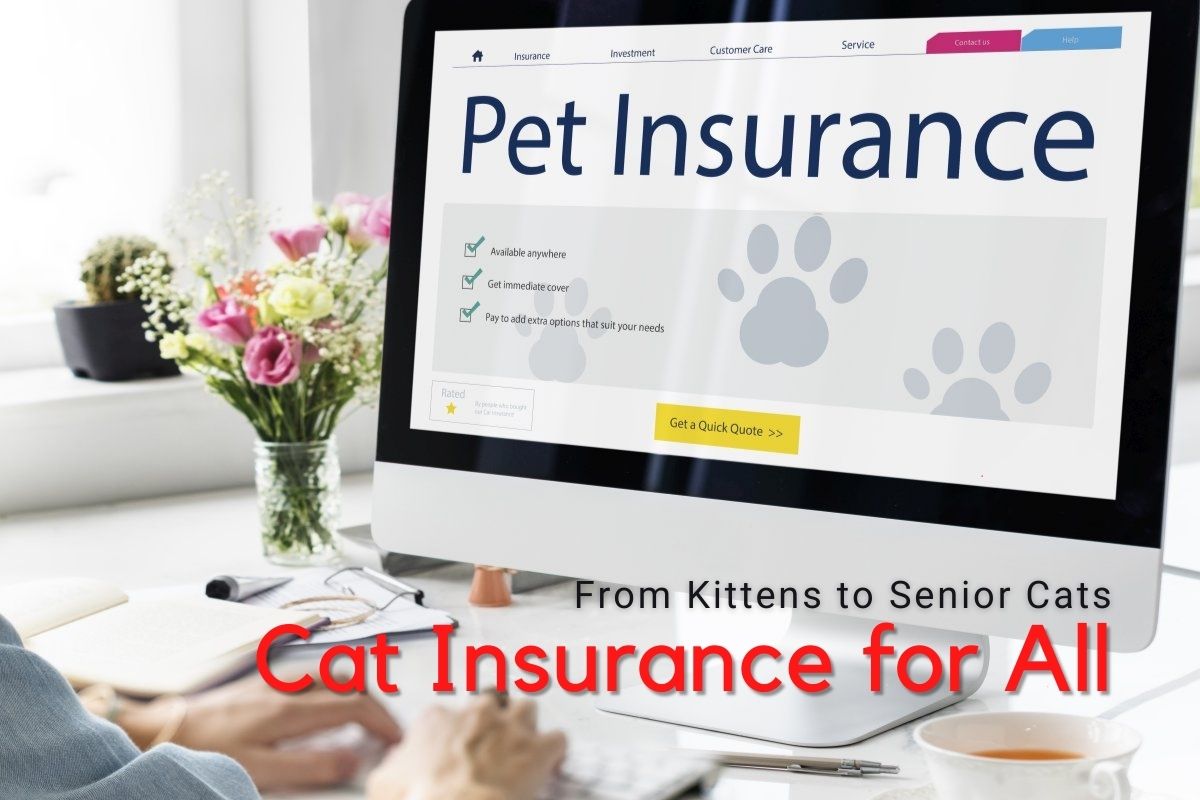
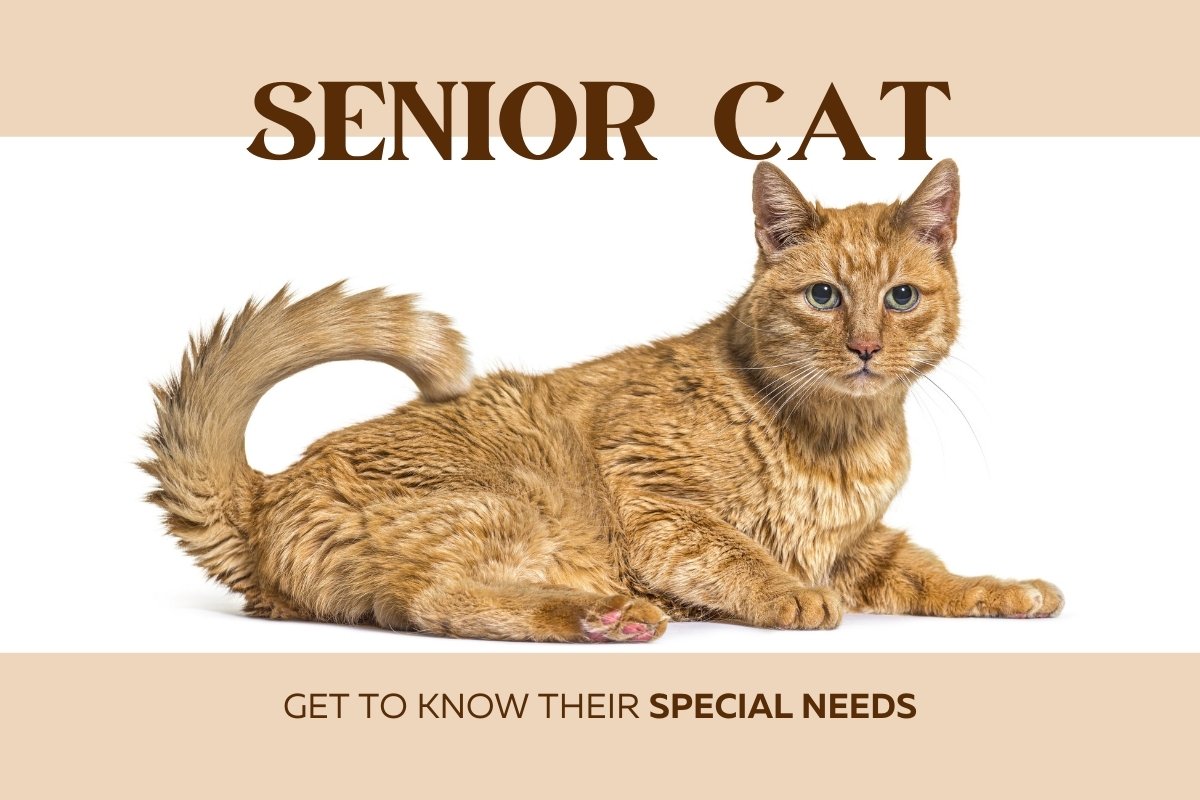
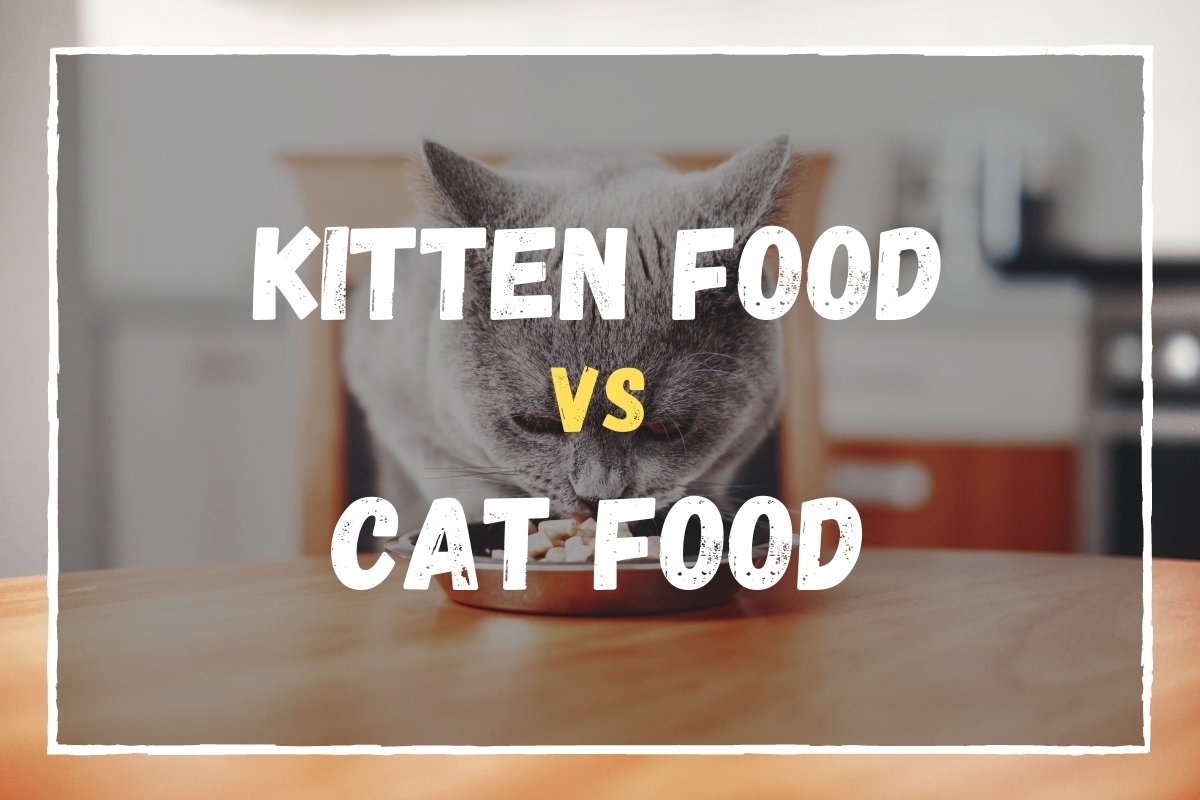
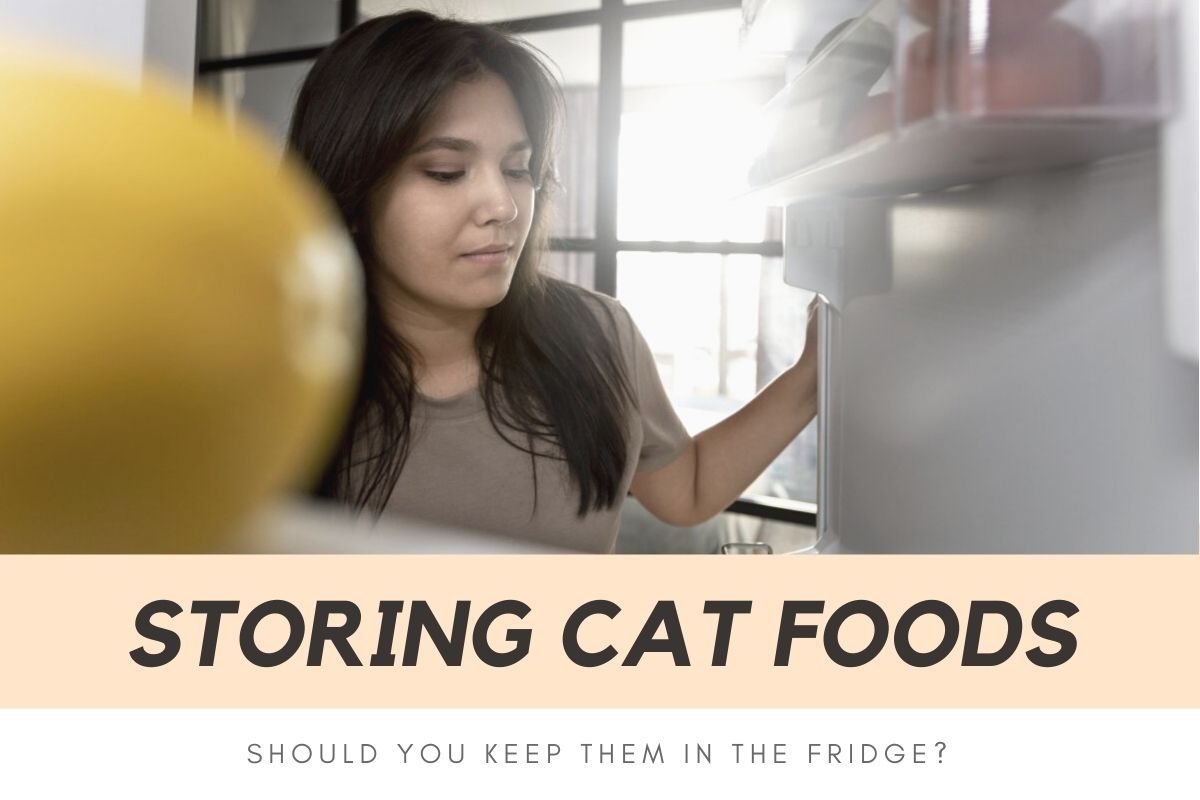
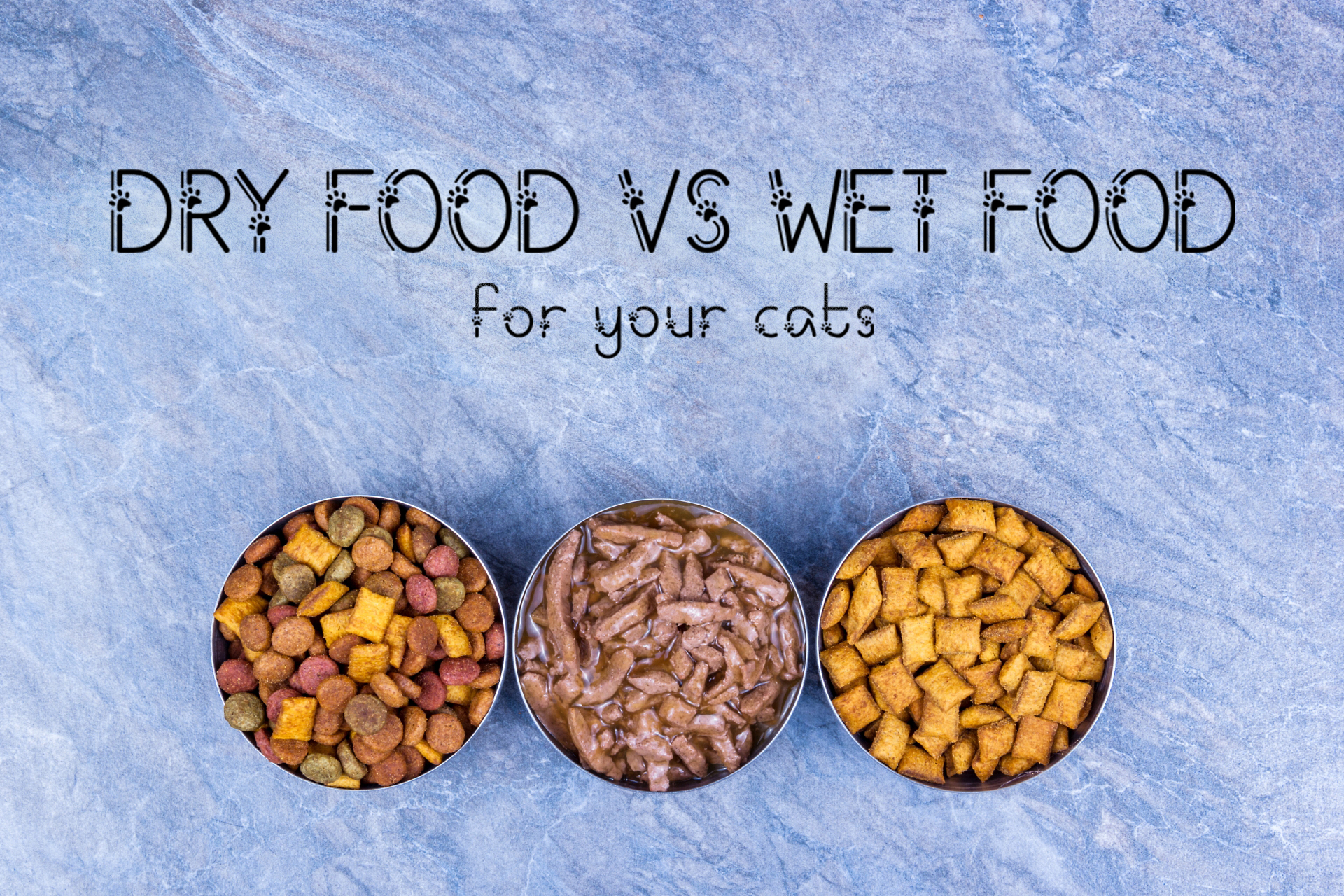
4 comments